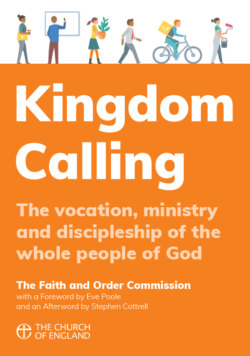Читать книгу Kingdom Calling - The Faith and Order Commission - Страница 10
На сайте Литреса книга снята с продажи.
Overview
ОглавлениеThe theological overview document from the Faith and Order Commission referred to earlier, Calling All God’s People, sought to sketch out concisely how the rhythm of the church in commissioning for service and dwelling in communion embraces three critical themes: calling, discipleship and ministry. The present more extended report, designed primarily for those with responsibilities for preaching, teaching and training in the Church of England, also has three main chapters linked to the same three themes, while acknowledging that they cannot be neatly separated. It develops some of the core ideas presented in that overview text, by expounding them in greater depth and by facing more fully some of the challenges that they raise. It also recognizes the need of those who preach, teach and train to set those ideas in historical context, including the recent past: how did we get here, how have we learnt from previous work done in this area, and where are there existing resources from which we can continue to benefit? Such resources include those pre-dating the period in the mid-twentieth century in which the set of concerns reviewed in this Introduction about the recognition of the laity in the life of the church comes into focus as a distinct issue.
The approach here is also different from the previous document in some significant respects, as the previous two sections of the Introduction make clear. Rather than simply seeking to present good theology in this area, we are trying to understand why it is that poor theology continues to be evident in our everyday understanding of the church in the world, inhibiting the full participation of all God’s people in responding to God’s call. Proposals for the healing of our theological vision need to be aligned with the diagnosis that is offered as to what is obscuring it.
In the light of this different aim, we have chosen to address the three themes here in a different order. ‘Vocation’ is still the focus for the first chapter, but ‘ministry’ comes next with ‘discipleship’ being addressed in the final chapter. Debates about ‘ministry’ are critical for pursuing the diagnosis being offered in the report, as will be evident from some of the examples already given, while ‘discipleship’ frames the pathways to healing in Christ’s company that all members of Christ’s body need in order to overcome the obstacles to full participation in his mission and ministry in the world.
We begin with vocation because it provides the crucial context for addressing the first factor identified in the previous section as inhibiting God’s people from responding to God’s call: a weakness of theological imagination regarding how we fulfil our calling before God day by day in the ordinary experiences of our lives. The chapter introduces an important distinction between three kinds of vocation: relational, social and ministerial. This threefold understanding is then woven through the following two chapters. A significant element in the pathways to healing outlined in the first two chapters concerns the importance of making good distinctions that affirm diverse forms of vocation and ministry, without making one form primary or paradigmatic or letting them fall into a hierarchy of value. The final chapter on discipleship, in contrast, emphasizes what is common to everyone in the life of the church, across these different forms of vocation and ministry, as we respond together to the challenges of receiving God’s call. It shows too how the different forms are inseparable from one another.
Although the diagnosis outlined in the previous section is relevant to all three themes, as noted there each chapter has a particular focus on one of the critical factors identified as undermining the consistent affirmation of the participation of all God’s people in the whole of God’s work. The focuses are on, respectively: weakness of theological imagination in how we see participation in different areas of society; impoverished understanding of the church; and disorientation in responding to powerful currents within our culture. Correspondingly, the chapter on vocation draws especially on the doctrine of creation, the chapter on ministry on the doctrine of the church, and the chapter on discipleship on the doctrine of Christ, as they seek to point towards pathways to healing, through the renewing of our minds.
Finally, the Faith and Order Commission is well aware that a single report cannot do justice to the many issues that have already been raised in this Introduction. Kingdom Calling needs to be read in the context of other work the Commission has been engaged in – not only Calling All God’s People, but its report on Senior Church Leadership published in 2015, and also Witness, which takes the theme of witness as a theological lens for considering the life of Christian communities.27 The Commission has been giving attention for some time to the subject of missional ecclesiology – the inseparability of church and mission and the implications of this, not least when God’s mission is recognized as encompassing the whole world. It is hoped that a publication on this will be forthcoming soon, providing a further and vital resource for addressing the limitations in theological imagination that constrain our freedom to respond together as God’s people to God’s call.
